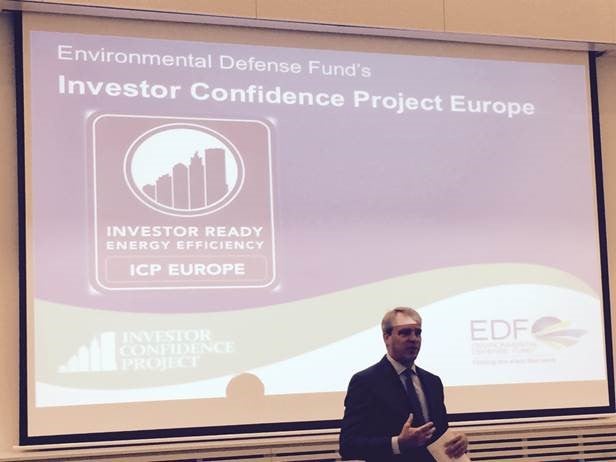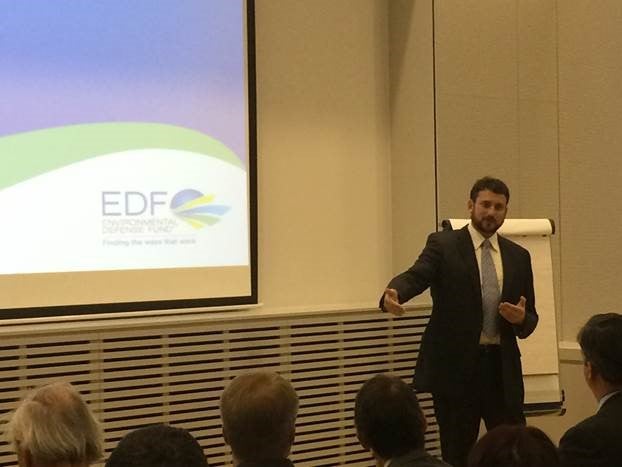By Panama Bartholomy, Director, ICP Europe, with contributions from Steven Fawkes, Senior Advisor, ICP Europe

EDF’s Andy Darrell, Chief of Strategy, US Climate and Energy and New York Regional Director, at the ICP Europe launch in Brussels
Environmental Defence Fund’s signature energy efficiency initiative has gone international. EDF Europe/UK today rolled out the Investor Confidence Project Europe (ICP Europe), aimed at boosting private sector investment in European energy efficiency renovation projects in the building sector.
As Director of ICP Europe, I was thrilled to introduce the initiative with leaders from the financial, engineering, and government communities at an event in Brussels during a week when two of Europe’s largest energy efficiency events are being held: Renovate Europe Day and Building Performance Institute of Europe ‘s Efficiency Investors Day.
The potential for renovating existing buildings in Europe to reduce the impacts of climate change, generate financial savings, and create jobs is considerable – and largely untapped. Estimates say that large-scale energy efficiency efforts in Europe could reduce carbon emissions by 932 million metric tons, equivalent to taking nearly 200 million cars off the road, and create more than 1 million new jobs in the building industry by 2050.
Recognizing this, the European Commission has set a goal of reducing carbon emissions by 90 percent in the building sector by 2050. However, significant investment will be needed to achieve the 2050 goals, estimated at €3.5 trillion, or an annual €95 billion. Investment at this scale requires substantial financing from private sector investors who will need to view building renovation projects as safe and profitable investments.
The goal of ICP Europe, which is modeled after the U.S.-based Investor Confidence Project (ICP), is to help transform the energy efficiency market by standardizing how building renovation projects are developed and measured. This will streamline energy efficiency transactions and increase the reliability of projected energy savings.
Standardization reduces risks and transaction costs for investors, spurring financing that will lead to a building sector with lower operating costs, higher market value, and a significantly lower carbon footprint. Over the longer term, the initiative aims to make energy efficiency a recognized asset class that will enable capital markets to invest in energy efficiency projects.
In virtually all established markets, from car loans to timeshares, standardization and automation has helped to accelerate underwriting, reduce long-term liability, and spur investment. If the same could be done for energy efficiency finance, it could help raise the vast amounts of capital needed to meet Europe’s ambitious carbon goals.
ICP Europe has industry support
The Energy Efficiency Financial Institutions Group – convened by the European Commission and United Nations Environment Programme Finance Initiative – specifically highlighted ICP in its interim report, Energy Efficiency – the first fuel for the EU economy, as a model industry best practice. It also called for the “launch of an EU-wide initiative to develop a common set of procedures and standards for energy efficiency and buildings refurbishment underwriting for both debt and equity investments.”
The International Energy Agency also weighed in last month, saying in its Energy Efficiency Market Report 2014, “[ICP] will facilitate a global market for financings by institutional investors that look to rely on standardized products rather than project-specific structuring and due diligence.”
What the Investor Confidence Project Europe is not
It is important to understand what ICP Europe is not. It is not developing new technical standards; plenty of these exist. Rather, it is about using the available standards in a common way through the entire process of developing and documenting energy efficiency projects.
Furthermore, ICP Europe does not exist simply to enforce a U.S. model. The process of developing a project anywhere in the world will follow the same process but use different engineering standards. What will be common between the U.S. and Europe is an approach, not specific standards or protocols. This is essential because the world of finance is international and many of the large institutional investors who want to invest in energy efficiency, but are currently constrained from doing so, operate on both sides of the Atlantic and, indeed, around the world.
Powerful Pan-European support
We have built a powerful pan-European coalition of banks, development banks, investors, property owners, energy efficiency companies, and government agencies, among others, who support ICP Europe.
This includes a steering group from the top organizations and companies in their sectors: ING Bank, Green Investment Bank, eu.ESCO, Plus Ultra Asset Management, ARUP, EuroACE, RdA Climate Solutions, Siemens, E.ON, Building Performance Institute of Europe, Climate Strategy, and United Kingdom Department of Energy and Climate Change.
ING Commercial Banking’s Global Head of Energy and Carbon Efficiency, Stephen Hibbert, said the bank is “enthused to be a member of the steering group and look forward to sharing our experience and playing our part in building an effective market for energy efficiency finance.”
To participate in this exciting initiative, please join the ICP Europe Technical Forum to help us choose from among the leading energy efficiency standards, or support us by joining the no-cost ICP Europe Ally Network.










